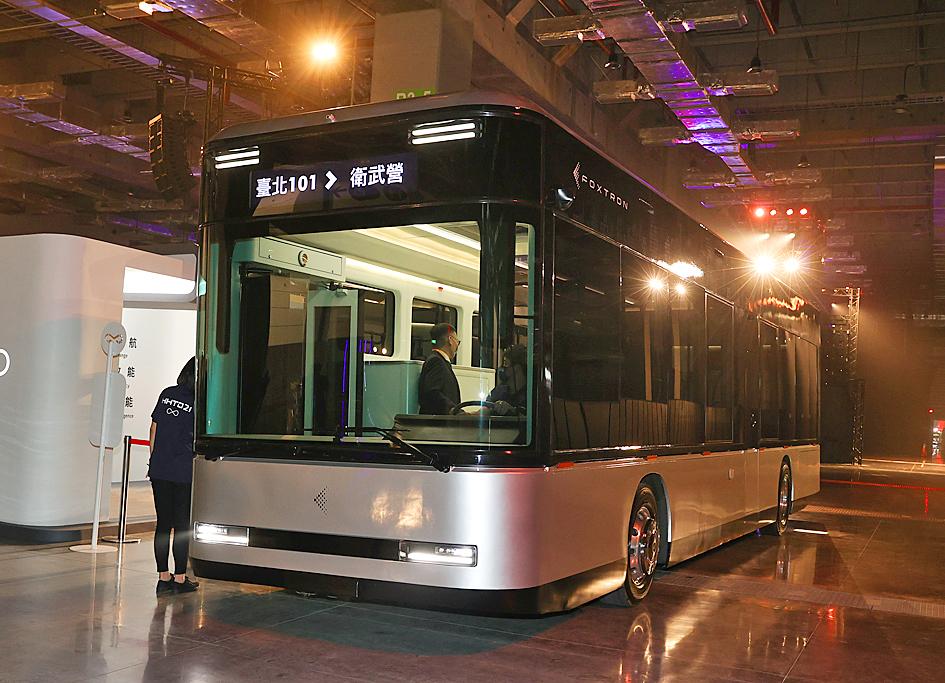Hon Hai Precision Industry Co (鴻海精密) is scheduled to deliver its first electric buses to Kaohsiung-based conglomerate San Ti Group (三地集團) on Thursday.
The electric buses are based on the Model T electric bus prototype unveiled on Oct. 18 last year by Hon Hai and its Foxtron Vehicle Technologies Co (鴻華先進科技) joint venture with automaker Yulon Group (裕隆集團).
Hon Hai said that with the new buses, Kaohsiung would be able to provide new public transportation options to connect communities around the city.

Photo: CNA
Foxtron in July last year signed a memorandum of understanding with San Ti subsidiaries North-Star International Co (北基國際) and Kaohsiung Bus Co (高雄客運) for the purchase of electric buses developed on Hon Hai’s MIH Open Platform.
Hon Hai said the new buses would join Kaohsiung Bus’ fleet, without elaborating on the number to be delivered.
In addition to the Model T electric bus, Hon Hai also debuted Model C sports utility vehicle and Model E passenger car under the MIH Open Platform in October last year.
This year, the comppany is scheduled to unveil two additional prototypes at the Hon Hai Tech Day event, chairman Young Liu (劉揚偉) said.
Hon Hai last week announced that it would set up an electric vehicle joint venture in Saudi Arabia, investing 562.5 million riyal (US$149.94 million) in an 8.2 percent-stake in the new company, saying that it is seeking to establish a foothold in the Middle East.
In the US, Hon Hai has worked with Lordstown Motors Corp to develop the Endurance electric pickup truck, which is expected to begin mass production as early as the third quarter of this year.
In the Thai market, Horizon Plus Co, a joint venture set up by Hon Hai and state-owned oil supplier PTT Public Co, was established early this month, and construction of its production lines is expected to be completed in 18 to 24 months, with commercial production scheduled for the first half of 2024.
Hon Hai and e-scooter brand Gogoro Inc (睿能創意) late last month signed a memorandum of understanding for electric vehicle development with the Indonesian Ministry of Investment, battery supplier PT Industri Beterai Indonesia (IBC) and energy developer PT Indika Energy. The deal is expected to be finalized next month.
Liu has said that Hon Hai is seeking to generate NT$20 billion (US$713.75 million) in sales from its vehicle parts units this year, but added that the goal was subject to a revision based on changes in the market.
Over the next five years, Hon Hai has forecast that the electric vehicle business would generate NT$1 trillion in revenue.

Taiwan’s long-term economic competitiveness will hinge not only on national champions like Taiwan Semiconductor Manufacturing Co. (TSMC, 台積電) but also on the widespread adoption of artificial intelligence (AI) and other emerging technologies, a US-based scholar has said. At a lecture in Taipei on Tuesday, Jeffrey Ding, assistant professor of political science at the George Washington University and author of "Technology and the Rise of Great Powers," argued that historical experience shows that general-purpose technologies (GPTs) — such as electricity, computers and now AI — shape long-term economic advantages through their diffusion across the broader economy. "What really matters is not who pioneers

In a high-security Shenzhen laboratory, Chinese scientists have built what Washington has spent years trying to prevent: a prototype of a machine capable of producing the cutting-edge semiconductor chips that power artificial intelligence (AI), smartphones and weapons central to Western military dominance, Reuters has learned. Completed early this year and undergoing testing, the prototype fills nearly an entire factory floor. It was built by a team of former engineers from Dutch semiconductor giant ASML who reverse-engineered the company’s extreme ultraviolet lithography (EUV) machines, according to two people with knowledge of the project. EUV machines sit at the heart of a technological Cold

TAIWAN VALUE CHAIN: Foxtron is to fully own Luxgen following the transaction and it plans to launch a new electric model, the Foxtron Bria, in Taiwan next year Yulon Motor Co (裕隆汽車) yesterday said that its board of directors approved the disposal of its electric vehicle (EV) unit, Luxgen Motor Co (納智捷汽車), to Foxtron Vehicle Technologies Co (鴻華先進) for NT$787.6 million (US$24.98 million). Foxtron, a half-half joint venture between Yulon affiliate Hua-Chuang Automobile Information Technical Center Co (華創車電) and Hon Hai Precision Industry Co (鴻海精密), expects to wrap up the deal in the first quarter of next year. Foxtron would fully own Luxgen following the transaction, including five car distributing companies, outlets and all employees. The deal is subject to the approval of the Fair Trade Commission, Foxtron said. “Foxtron will be

INFLATION CONSIDERATION: The BOJ governor said that it would ‘keep making appropriate decisions’ and would adjust depending on the economy and prices The Bank of Japan (BOJ) yesterday raised its benchmark interest rate to the highest in 30 years and said more increases are in the pipeline if conditions allow, in a sign of growing conviction that it can attain the stable inflation target it has pursued for more than a decade. Bank of Japan Governor Kazuo Ueda’s policy board increased the rate by 0.2 percentage points to 0.75 percent, in a unanimous decision, the bank said in a statement. The central bank cited the rising likelihood of its economic outlook being realized. The rate change was expected by all 50 economists surveyed by Bloomberg. The